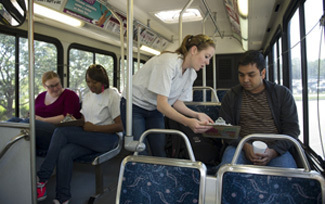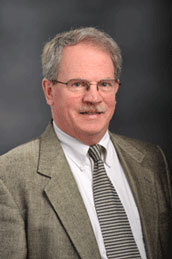
A ridership survey designed by University of Notre Dame students will yield valuable information for TRANSPO, South Bend’s public transportation system.
“The customer satisfaction survey, designed by Notre Dame students and then implemented by those same students while riding our local buses, benefits us in a number of ways,” said Jeanette Pancoas, TRANSPO marketing manager. “Not only do we have more comprehensive information about our riders, but the presence of the students surveying riders on the bus conveyed a genuine concern for customer feedback.”
Logistics and timing were crucial to the success of the project, which was conducted by students of Mark Gunty, undergraduate analytics program director in strategic planning and institutional research and a concurrent assistant professor of sociology.
The schedules of 18 bus routes changed in April, midway through the semester. Gunty coordinated the schedules of 33 students to administer surveys in both English and Spanish on 54 rides — two to three students per ride — and at the central bus station in downtown South Bend at peak and off-peak times.
Gunty needed to be able to guarantee the timeliness of the project’s completion and the quality of his students’ work, and assure that the fieldwork met his strict criteria for quality learning for his students. The criteria were met to ensure a powerful outcome for all involved.

Gunty utilizes community-based research principles to teach the research methods course. The short-term project was ideal as the required skills had just been covered in the course.
Utilizing a studio approach, Gunty brought in the client — in this case, two TRANSPO employees — to make a brief presentation to his students about the type of questions they needed answered.
Gunty described that class as “magical.” During the 20 minutes following the client presentation, 75 percent of the students participated, asking questions of the employees to better understand the project needs.
“Like good scientists, the students asked all the right questions," says Gunty. "They were able to clarify the purpose of the project, anticipate possible issues and formulate a plan — all skills that you cannot teach in a classroom. Learning these skills in the field is vital to their future professional pursuits.”
Timing was also important. If Gunty introduced the project too early in the semester, the students would not yet have studied the needed skills to execute the project successfully. If he waited too long, they would not have the three weeks needed to collect data from local TRANSPO customers while riding the buses and administering surveys at designated times on designated routes.
“The commitment and professionalism of Professor Gunty and his students were the biggest contributors to the success of this project,” said Pancoast, “and the mutual respect each partner displayed throughout the process was invaluable.”